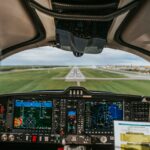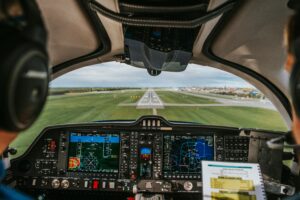Are you considering a career as a pilot and wondering whether or not you should go to university to make it happen? There are a few different pathways to becoming a pilot, and earning a degree in aviation or a related field is just one of them. In this article, we’ll explore the pros and cons of going to university to become a pilot, as well as the requirements and job outlook for this exciting and rewarding career.
The various pathways to becoming a pilot
First, let’s take a look at the different pathways to becoming a pilot. If you’re still in high school, you might be wondering how you can get started on the path to becoming a professional pilot. One option is to attend a college or university and enroll in a degree program in aviation. These programs typically offer a combination of classroom instruction and flight training, and can lead to a bachelor’s degree in aviation or a related field. Alternatively, you can enroll in a flight school or other specialized training program that is not affiliated with a college or university. These programs may offer shorter, more focused courses of study, and can be a good option for those who want to get started on their pilot training as soon as possible.
The advantages and disadvantages of going to university
So, should you go to university to become a pilot? There are a few key factors to consider when making this decision. One major advantage of earning a degree in aviation is that it can open up a wider range of career opportunities. Many major airlines and other employers prefer to hire pilots who have a bachelor’s degree, and a degree in aviation or a related field may be required in order to qualify for certain positions. Additionally, a degree in aviation can provide a more well-rounded education, giving you a deeper understanding of the technical and business aspects of the aviation industry. This can be especially useful if you’re interested in working in management or other non-pilot roles within the industry.
On the other hand, attending a college or university to become a pilot can be a significant investment of time and money. A full-time degree program in aviation can take four years or more to complete, and tuition and other expenses can add up quickly. If you’re not sure that you want to commit to a four-year degree program, or if you’re looking for a more flexible or cost-effective option, a flight school or specialized training program may be a better fit.
The job outlook for pilots
Another factor to consider is the current job market for pilots. There is currently a pilot shortage in the aviation industry, which means that there is high demand for qualified pilots at both regional and major airlines. This can be good news for prospective pilots, as it means that there are plenty of job openings available. However, it’s important to note that the requirements for becoming a commercial pilot vary from one employer to the next, and some may have more stringent education requirements than others. If you’re interested in working for a major airline, for example, you may need to have a bachelor’s degree in aviation or a related field in order to qualify for certain positions.
Which degree should I choose?
There are a few different degree options to consider if you’re interested in becoming a pilot. Here are a few possibilities:
- Aviation Degree: Many colleges and universities offer degree programs in aviation that are specifically designed for aspiring pilots. These programs typically include a combination of classroom instruction and flight training, and can lead to a bachelor’s degree in aviation or a related field. These programs can provide a well-rounded education that covers the technical and business aspects of the aviation industry, and may be preferred by some employers.
- Aerospace Engineering Degree: If you’re interested in the technical side of aviation and want to learn more about aircraft design, maintenance, and operation, a degree in aerospace engineering could be a good fit. These programs typically focus on the principles of physics and engineering as they relate to the design, construction, and operation of aircraft, spacecraft, and other aerospace systems.
- Business Degree: If you’re interested in working in management or other non-pilot roles within the aviation industry, a business degree could be a good choice. These programs can provide a broad education in business principles, including finance, marketing, and management, and can be useful for those interested in pursuing careers in aviation management, airport management, or other related fields.
Ultimately, the best degree for you will depend on your interests, career goals, and the specific requirements of the programs you’re considering. It’s a good idea to research and compare different degree programs to find the one that best fits your needs. You may also want to speak with professionals in the aviation industry or with admissions advisors at different colleges and universities to get more information about your options.
So, what’s the bottom line? Should you go to university to become a pilot? It really depends on your individual goals and circumstances. If you’re certain that you want to pursue a career as a pilot and you’re comfortable committing to a four-year degree program, then earning a college degree in aviation can be a good investment. However, if you’re not sure that a four-year degree is right for you, or if you’re looking for a more flexible or cost-effective option, a flight school or specialized training program may be a better fit. Ultimately, the decision of whether or not to attend university to become a pilot is one that only you can make, and it’s important to consider all of your








